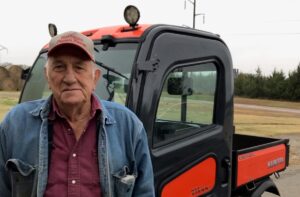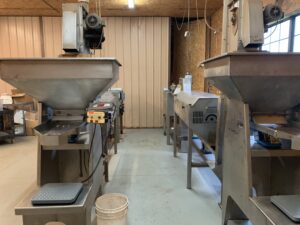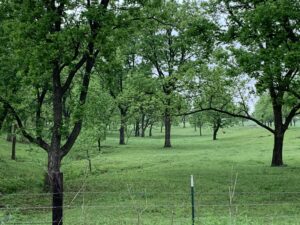
Dick and Jean Hoffman started Hoffman Pecan Farm in 1962 with a few pecan trees and 80 acres. Photo by Kelsey Chambers, FSA.
By Madeline Alewine, FSA, Oklahoma
Meet Dick Hoffman of Hoffman Pecan Farm in Payne County, Oklahoma. Dick and his wife, Jean, started the operation in 1962 with a few pecan trees and 80 acres. Over the course of 58 years, their small purchase has grown into a much larger farm with more than 1,000 trees and over 100 different pecan varieties.
Growing the Business
Hoffman Pecan Farm is a family business operated by Dick, Jean, and their three sons. The family attributes their success to good grafting practices and great business.
Five years after the Hoffman’s initial land purchase, they were encouraged to begin grafting pecan trees. It was in 1981 that Oklahoma State University recruited Dick to provide the grafting wood to other pecan producers around the state.

The farm runs two commercial cracking units with the capability of cracking 1,000 pecans per minute. Photo by Kelsey Chambers, FSA.
He later assisted Oklahoma State University establish a research station in Perkins, Oklahoma. The Hoffman family helped the Pecan Research Station graft over 400 varieties of pecan trees.
The farm runs two commercial cracking units with the capability of cracking 1,000 pecans per minute. Hoffman Pecan Farm cracks pecans for commercial and local producers. Hoffman sells their pecans locally and in their on-farm store where visitors can find a variety of products such as pecan oil, honey, jams, salsa, and Hoffman Farm raised USDA Angus Beef.

Hoffman Pecan Farm is a family business operated by Dick, Jean, and their three sons. Photo by Kelsey Chambers, FSA.
Working with USDA
The United States Pecan Industry is responsible for most of the world’s pecans. The Hoffmans annually enroll in the Noninsured Crop Disaster Assistance Program, offered by USDA’s Farm Service Agency, to protect their pecans against natural disasters that result in lower yields or crops losses. NAP is available for crops where Federal crop insurance is not available.
Following the tariffs placed on trade with China, Hoffman Pecan Farm was one of the many Oklahoma farms that suffered financially. To lessen the economic impact, FSA implemented the Market Facilitation Program.
“To justify the amount of equipment needed, we need to crack a lot of pecans. The program helped us tremendously,” Hoffman said. Hoffman Pecan Farm received a payment, which was essential to the farm’s success. The payment helped offset the reduction of pecan prices due to trade and weather-related issues.
When farmers began to feel the financial impacts of COVID-19, USDA rolled out the Coronavirus Food Assistance Program to help producers who faced market disruptions due to the pandemic. The Hoffmans were able to get relief for both their beef and pecan operations. CFAP is part of USDA’s broader Pandemic Assistance for Producers initiative to help producers like Dick and Jean offset the losses of the pandemic.
For over half a century, through hardship and prosperity, Dick and Jean have grown and grafted their dream. Every year, there are a few more trees, more customers to serve, and more pecans to crack.
More Information
USDA offers a variety of risk management, disaster assistance, loan, and conservation programs to help agricultural producers in the United States weather ups and downs in the market and recover from natural disasters as well as invest in improvements to their operations. Learn about additional programs.
For more information about USDA programs and services, contact your local USDA service center.
Madeline Alewine is an administrative technician for FSA in Oklahoma.





